In his welcome address Mr. Ravi Kishore, Secretary General (honorary) IAECF and advocate, Supreme Court of India, made a strong case for further upgrading and consolidating the quickly expanding Indio-ASEAN ties. He made the point with the help of relevant data.
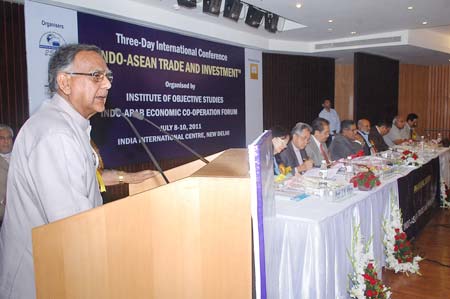
Speaker: Prof. Z.M. Khan, Secretary General, IOS
Prof. Z.M. Khan, Secretary General IOS, presented an overview of the areas of functioning of IOS and future plans, which included the expansion of ties with universities and other institutions of higher learning all over India as well as research in collaboration with government departments and ministries. He also presented a layout of IOS Silver Jubilee programmes all over India over the coming months.
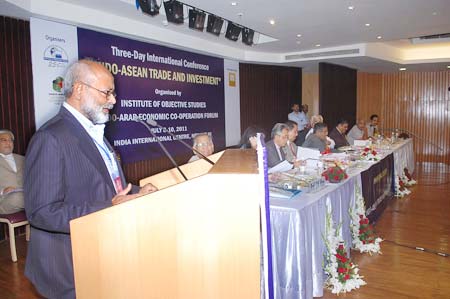
Speaker: Dr. Mohammad Manzoor Alam, Chairman, IOS
In his presentation, headlined “A Few Words” and with the subtitle “Indo-ASEAN Ties: Case for Deeper Ties”, Dr. Mohammad Manzoor Alam, Chairman IOS and President IAECF, observed that trade did not exist in a security vacuum and India should raise its profile in the huge water bodies surrounding the South-East Asian region.
“With our blue water navy, our warships and our aircraft carriers” we should think of some power projection in the neighbourhood, he advised. He said this was necessary because some of our South-East Asian neighbours were worried about the growing military heft of China.
Dr. Alam said a more pro-active stance on South-East Asia was imperative for India in the background of our old historical and cultural ties with the region and our fast-expanding economic relations today.
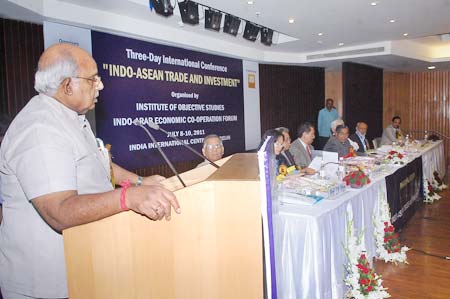
Speaker: Prof. (Dr) Vinayshil Gautam, Founding Director IIM (K) and Professor and first Head Management Studies IIT (D)
In his special address, Prof. (Dr) Vinayshil Gautam, Founding Director IIM (K) and Professor and first Head Management Studies IIT (D), said ties with the ASEAN covered a larger gamut of issues than being merely an affair confined to corporates.
He said disaster management and mitigation might not be the concern of India Inc., or its South-East Asian equivalents, but disasters knew no political boundaries and constituted a major area of concern for the people and governments of the countries in the region.
Sharing of material resources, skills and know-how in coming to grips with issues of ocean, commerce, illegal logging and fishing, the menacing methane haze hanging over much of the region and piracy had to be in focus.
To be able to utilise the massive energy resources of the region and its natural wealth “sovereignty-sensitivity” would have to be reigned in and some tangible steps towards greater regional integration would have to be taken, he opined.
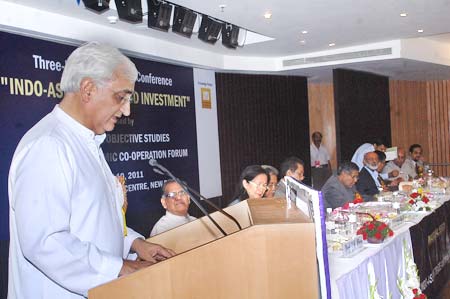
Speaker: Mr Salman Khurshid, Union Minister for Minority Affairs and Water Resources
In his inaugural address, Union Minister for Minority Affairs and Water Resources, Mr Salman Khurshid said water issues would be of seminal significance for countries of the Indian Ocean rim right from East Africa, Saudi Arabia, India to several ASEAN countries.
Strategic issues like piracy and security of shipping through the huge water bodies surrounding the massive tracts of land would have to come to the fore. “The question is, ‘who is going to be the bridge, or, the pivot’, for the entire area stretching from East Africa, Saudi Arabia, India to South-East Asia”, he asked.
He said there were three angles in the equation: SAARC, ASEAN and Indian Ocean. A strategic understanding of the triangle was essential to any policy on the South-East Asian region.
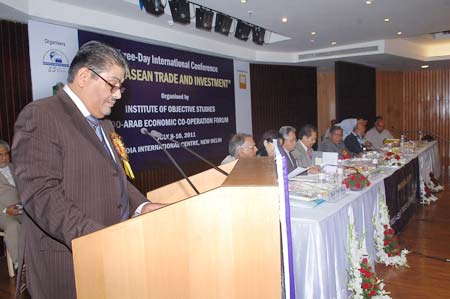
Speaker: HE Faisal Hassan Trad, Saudi Ambassador to India
One of the guests of honour, the Saudi Ambassador to India, Mr. Faisal Hassan Trad, said that Saudi Arabia was as much a nation of the Indian Ocean rim as any other and it formed the fourth angle of the equation proposed by Mr. Khursheed. Thus, to him, the whole region extending from West Asia through South Asia and South-East Asia should be thought of as a rectangle of co-operation.
Ambassador Trad praised the IOS-IAECF for the effort they made to organise such a fruitful conference.
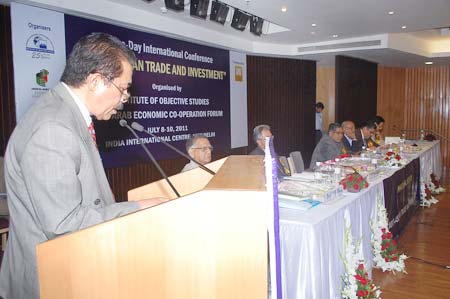
Speaker: HE Ronald B Allarey, Ambassador of Philippines to India, and Chairperson ASEAN Committee in Delhi
Another guest of honou, Mr. Ronald B Allarey, Ambassador of Philippines to India, and Chairperson ASEAN Committee in Delhi, facilitated the IOS-IAECF for organising the conference. Ambassador Allarey said, we are living in exciting times when India and ASEAN are busy building upon their old relations a future in which the two regions would be more closely integrated.”
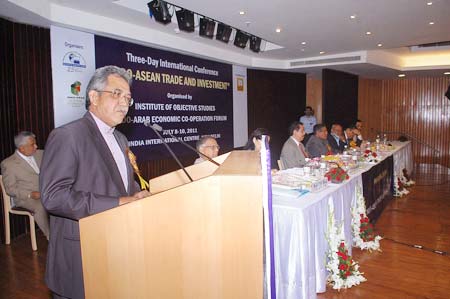
Speaker: HE Dato Paduka Sideq Ali, High Commessioner of of Brunei Darussalam in India
Guest of honour Datuk Paduka Sideq Ali, Ambassador of Brunei Darussalam in India, in his address took note of the “deepening relations between India and ASEAN, which are moving from strength to strength.” India and ASEAN, he said, accounted for a significantly large market which required a regime of “liberalised, transparent and protected investments.”
He showed the interdependability of India and ASEAN by telling how extreme weather conditions in India led to rise in the prices of onions in Brunei Darussalam.
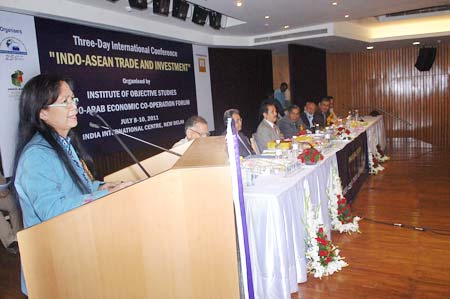
Speaker: HE Hendra Henny Andries, Minister Counsellor Embassy of Indonesia in India
Yet another guest of honour, Ms Hendra Henny Andries, Minister Counsellor Embassy of Indonesia in India, talked about the deep cultural ties between India and Indonesia and hoped it would lead to further deepening of economic relations.
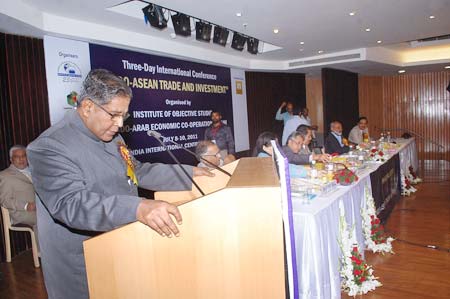
Speaker: Mr K Rehman Khan, Deputy Chairman, Rajya Sabha
In his presidential address, Mr K Rehman Khan, Deputy Chairman, Rajya Sabha, congratulated the IOS-IAECF for the remarkable conference and hoped it would help in advancing Indo-ASEAN trade and investment.
The programme was conducted by Mr Agha Sultan.
SECOND DAY (JULY 9, 2011)
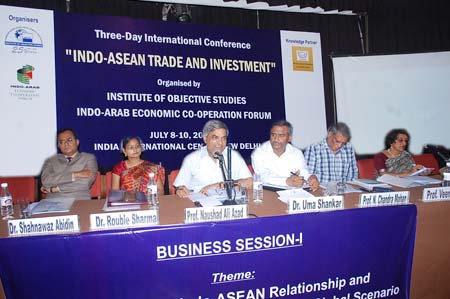
Business Session-I
The second day’s proceedings were spread over several business sessions. The first business session’s theme was “Importance of Indo-ASEAN Relationship and Ocean Aspects of Linkages in changing Global Scenario,” chaired by Prof. N. Chandra Mohan, Economist and Commentator.
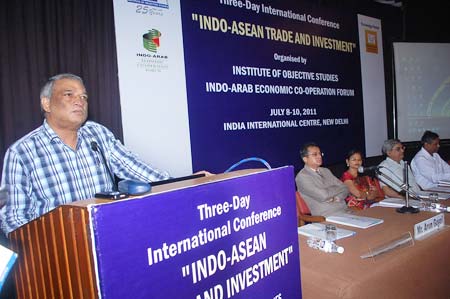
Speaker: Prof. N. Chandra Mohan, Economist and Commentator
Prof. N. Chandra Mohan said that a services trade agreement between India and ASEAN was vital for the region, but “nobody seems to be rooting for it.” India Inc., he said, seemed to have reservations although the trade volume between the two sides had grown. India had a trade deficit which could be corrected by a services trade agreement.
In places like Singapore India’s investment was quite vigorous. With a $ 21 billion FDI there, India’s investment constituted 27 percent of the total FDI in Singapore. Also, one-fifth of India’s FDI was going to Singapore, Malaysia, Thailand and Philippines.
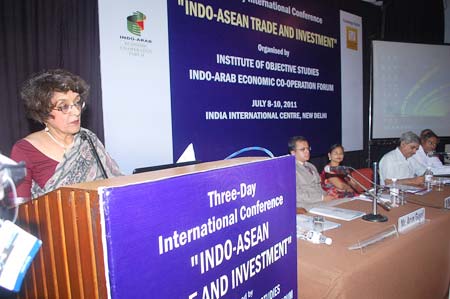
Speaker: Prof. Veena Sikri, Visiting Professor Jamia Millia Islamia and Former Diplomat
Prof. Veena Sikri, Visiting Professor Jamia Millia Islamia, said India was closely integrated with South-East Asia in earlier centuries, “but the colonial intervention, (Dutch East India Company, and British East India Company in particular) created a hiatus. Early in the 20th century, when Rabindra Nath Tagore learnt from the Dutch about history of ancient ties between the two regions, interest in the south-East Asian region was revived in India.
She emphasised a revival of people-to-people relations. The contact had grown recently as shown by two million Indian tourists visiting the region last year. However, South-East Asian tourist visits to India were not quite high: only 30, 000 of them came in.
Many more South-East Asian students went to Australian and British universities than Indian ones, Prof. Sikri observed.
She said there was “a subtext to growing Indo-ASEAN ties, that is the fear of China” among some of the smaller South-East Asian countries.
Ms Sikri, a former diplomat, posited that ASEAN should not always be taken as a bloc, but a conglomeration of individual countries.
Also, there had to be a sub-regional approach to issues like closer ties between Myanmar-Bangladesh-Nepal. As Indian states, too, could now sign agreements with sovereign countries, South-East Asian countries could have independent ties with India’s north-eastern states as well as West Bengal and Assam.
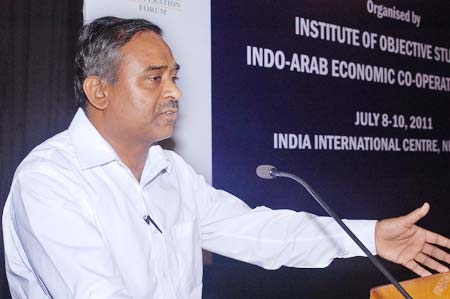
Speaker: Dr Uma Shankar, Associate Professor of Political Science, Delhi University
Dr Uma Shankar, Associate Professor of Political Science at Delhi University, said the demise of the Soviet Union had created new geo-political equations in South Asia and South-East Asia, opening up a wide space for India to operate in.
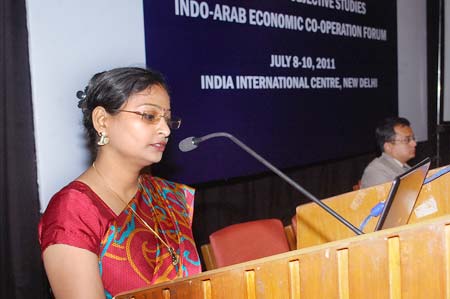
Speaker: Dr Rouble Sharma, Assistant Professor of Political Science, Delhi University
Dr Rouble Sharma, Assistant Professor of Political Science at Delhi University, opined that ocean related issues of trade had to be given particular attention. To drive home the point, she said 97 per cent of India’s international trade was maritime.
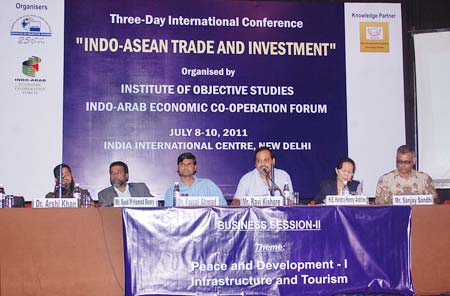
Business Session-II
The theme for the second session of the day was “Peace and Development-1: Infrastructure and Terrorism.” This session was chaired by Mr. Ravi Kishore, Secretary General IAECF and lawyer of Supreme Court of India. In his opening remarks Mr Kishore talked about focusing on development of human capital, markets and rule of law.
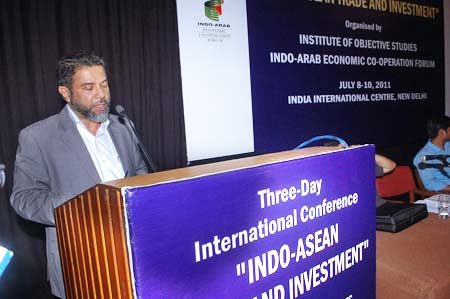
Speaker: Mr Syed Mohammad Beary, Chairman and Managing Director Beary’s Group, Bangalore
Mr Syed Mohammad Beary, Chairman and Managing Director Beary’s Group, made an interesting power-point presentation on the issues involved in Indo-ASEAN trade and investment.
He mentioned the remarkable volume of FDI in India in IT and BT, in road building and financial sector from Malaysia. “For India, it is a win-win situation”, he said.
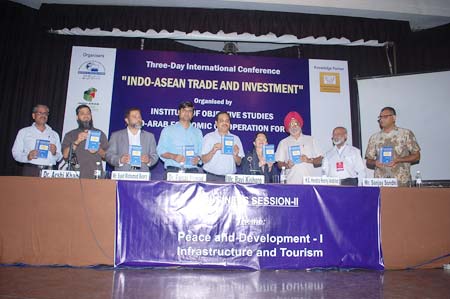
Book release: Hanuman Garhie Ayodhya Incident (Mrs Surinder Kaur and Mr Sher Singh IAS (Retd.))
“Appetite for FDI in realty sector in India is pretty huge and fast urbanisation of the country is creating greater need for more office and residential space across cities. Infrastructure, roads, telecom, hospitality, healthcare and new buildings would grow exponentially for decades to come.”
India need 25 million units for office space and residence, according to Mr Beary. The country rate among the top in BPO operations. The real estate industry had one of the highest returns on investment, up to 25 per cent. The construction industry, India was the second largest employer after agriculture. Real estate was worth $ 16 billion, according to Mr Beary. “It is a win-win situation all the way”, he concluded.
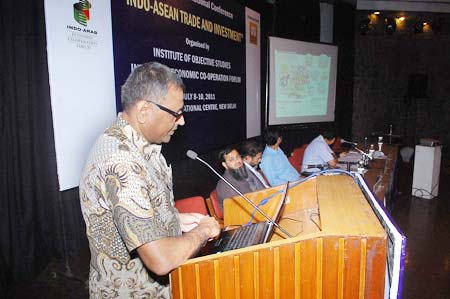
Speaker: Mr Sanjay Sondhi, Country Director Visit Indonesia (India office)
Mr Sanjay Sondhi, Country Director Visit Indonesia (India office) made a power point presentation on the tourist attractions in Indonesia. Her Excellency Ms Hendra Henny Andries of the Embassy of Indonesia began her address with a question: “Why is it that to get a visa to Indonesia one has to pay only $ 25, while to get an Indian visa one has to pay $ 65.” This imbalance must be addressed, she urged.
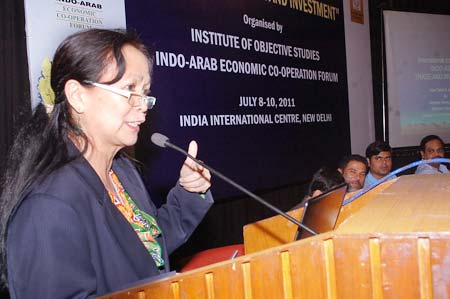
Speaker: Her Excellency Ms Hendra Henny Andries of the Embassy of Indonesia
On a more cheerful note she stated that the present annual two-way trade between India and Indonesia was $ 12 billion, projected to grow to $ 25 billion by 2015.
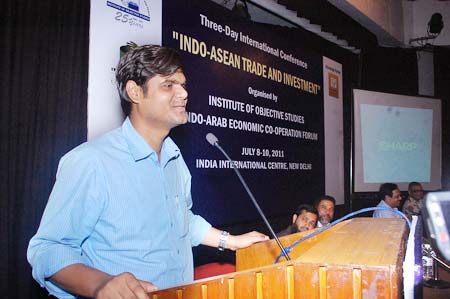
Speaker: Dr Faisal Ahmad, Associate Director, Centre for International Trade Economics, Jaipur
Dr Faisal Ahmad, Associate Director Centre for International Trade Economics, Jaipur talked about “region building.”
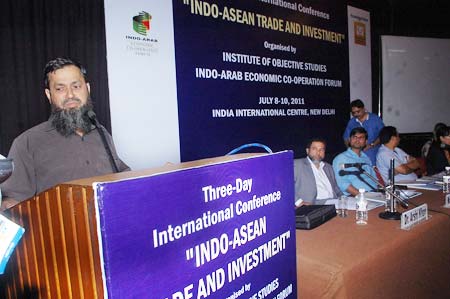
Speaker: Dr Arshi Khan of Department of Political Science, AMU
Dr Arshi Khan of Department of Political Science, AMU, observed that there was a tremendous distrust of big powers in South-East Asia as well as the fear of China.
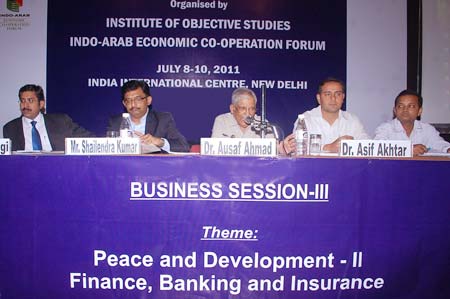
Business Session-III
The theme of the session was Peace and Development: Finance, Banking and Insurance. Mr. Ajay Tyagi, UTI Ltd., Mumbai; Mr. Shailendra Kumar, CEO, Eastwind Capital Advisors, New Delhi; Mr. Mohd. Faisal on behalf of Dr. Mohd. Nawaid Khan Academic Staff College, AMU, Aligarh; Dr. Asif Akhtar, Deptt. of Business Administration, AMU, Aligarh presented their papers. This session was chaired by Dr Ausaf Ahmad, Finance Secretary, IOS.
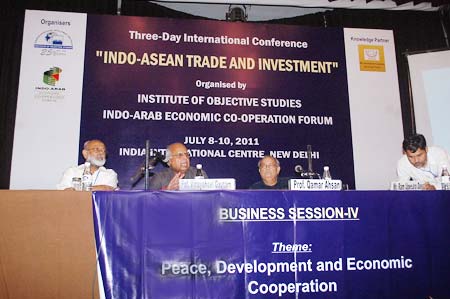
Business Session-IV
The theme for the next session was “Peace, Development and Economic Cooperation.” The session was chaired by Prof. Qamar Ahsan, former V-C Maulana Mazharul Haque Arabic and Persian University, Patna.
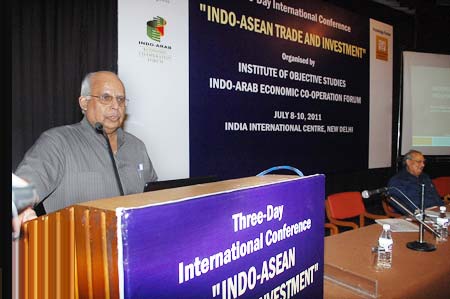
Speaker: Prof. (Dr) Vinayshil Gautam, Founding Director IIM (K) and Professor and first Head Management Studies IIT (D)
Prof. (Dr) Vinaysheel Gautam said that India was getting caught up in a frenzy of sloganeering. Using strong words for what was happening in India, he said that it was the death of humour and common sense.
“We are saying SAARC is not a success. The fact is that it never took off in the first place.” The fact that India had been left way behind by China was, he said, because “China has self-respect, but India does not.”
Thriving economies and societies spent heavily on education, while we did not, he said “Malaysia spends more on getting the youth educated in UK than on their domestic education.” That was because human capital was accorded the value it deserved.
That was why a country like Singapore, which had no water, no other natural resources, thrived on its human capital and self-reliance.
Prof. Gautam had this curt advice for Indians “Don’t talk big. Talk sense. Examine theories in the light of facts, don’t examine facts in the light of theories.”
DAY 3
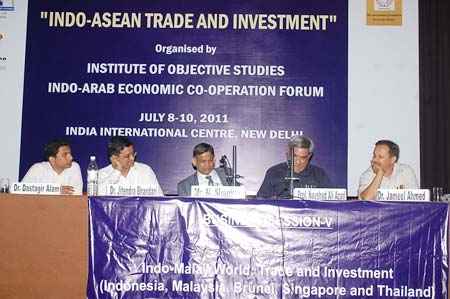
Business Session-V
The third day began with Business Session V, the theme of which was “Indo-Malay World: Trade and Investment (Indonesia, Malaysia, Brunei, Singapore and Thailand). The session was chaired by Mr N Shankar, Executive Director, EXIM Bank, Mumbai.
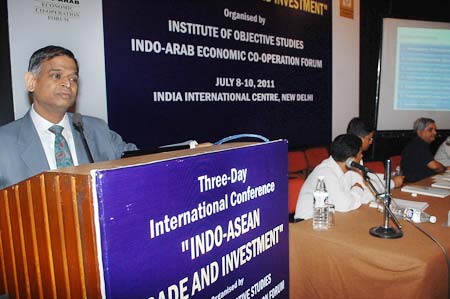
Speaker: Mr N Shankar, Executive Director, EXIM Bank, Mumbai
In his introductory remarks Mr Shankar said India’s GDP in 2010 stood at $ 1.7 trillion, which was projected to be $ 2 trillion next year. India had emerged as the third chosen FDI destination for FDI after China and the United States. Over the period between 2001-2010 Indian exports to Asian and African countries increased dramatically.
He observed that exports to the Malay world constituted 84 per cent of the exports to ASEAN. He said the Malay world had to be the focus of India’s ties with ASEAN.
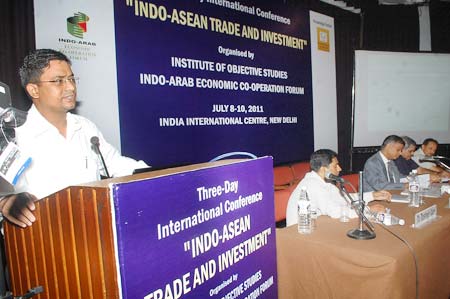
Speaker: Dr Jitendra Bhandari, Area Chairperson (Economics), Asia Pacific Institute of Management, New Delhi
Dr Jitendra Bhandari, Area Chairperson (Economics), Asia Pacific Institute of Management, New Delhi, in his address focused on Indo-Malaysian ties.
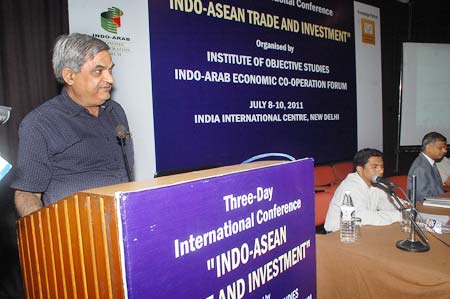
Speaker: Prof. Naushad Ali Azad, former Dean of Faculty of Social Sciences, Jamia Millia Islamia, New Delhi
Prof. Naushad Ali Azad, former Dean of Faculty of Social Sciences, Jamia Millia Islamia, New Delhi, argued for Indo-ASEAN economic integration. In fact, such integration was already underway as over the last decade India’s trade with ASEAN had grown to 10 per cent of its total international trade.
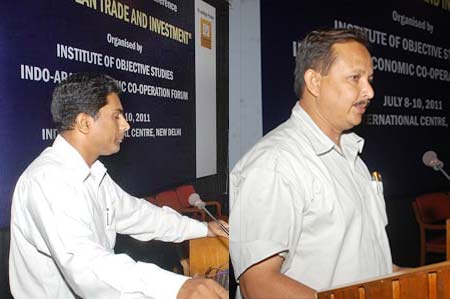
Speaker: Dr Dastgir Alam and Dr Jamil Ahmad
Dr Dastgir Alam of Economics Department, AMU, talked about Indo-Malaysian trade, while Dr Jamil Ahmad focused on Indo-Singapore trade.
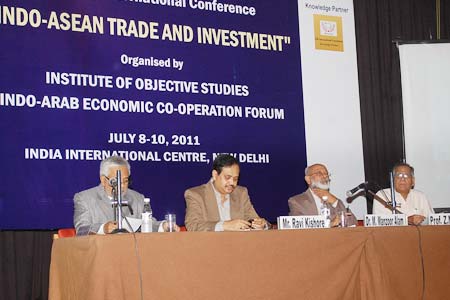
Interactive Session
Business Session VI was organised around the theme “Indo-Other ASEAN Countries: Trade and Investment (Philippines, Laos, Cambodia, Myanmar, Vietnam).” It was chaired by Prof. Rajesh Chadha, Senior Fellow NCAER, New Delhi.
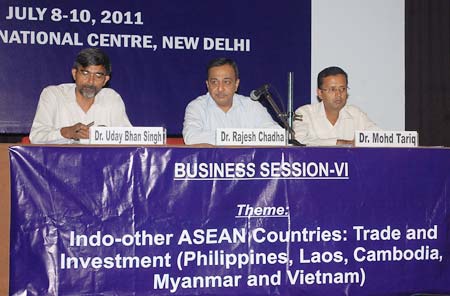
Business Session-VI
In his introductory remarks he said that as of now China had become the biggest trading partner of India. The North American Free Trade Association (NAFTA) had 27 members, while EU had 22. India, combined with ASEAN (ten members), would make an influential bloc.
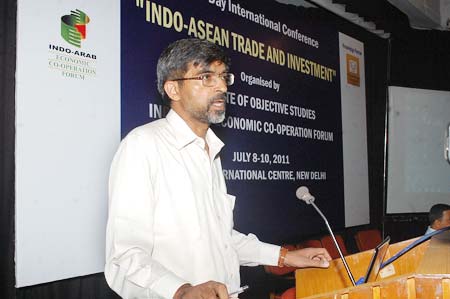
Speaker: Dr Uday Bhan Singh, Senior Research Associate, Institute of Defence Studies and Analyses
Dr Uday Bhan Singh, Senior Research Associate, Institute of Defence Studies and Analyses, concentrated on Indo-Myanmar relations from a strategic perspective. He said weak infrastructure in Myanmar and inadequate roads from North-East in India leading to Myanmar were a hindrance to strong ties.
The border roads and entry points were not fully functional. Although a parliament was in place in Myanmar after the elections, that country was still in transition from military rule to a democratic order.
India had built a 160 km road from North-East to Myanmar, but it was far inferior to the roads built by China on its side of Myanmar border. He favoured the construction of a road from Mizoram, which would ultimately connect the landlocked North-East to the Indian Ocean.
Mr Singh said building hydro-election projects, developing horticulture in North-East and connecting it to ASEAN directly would be of great economic and strategic value.
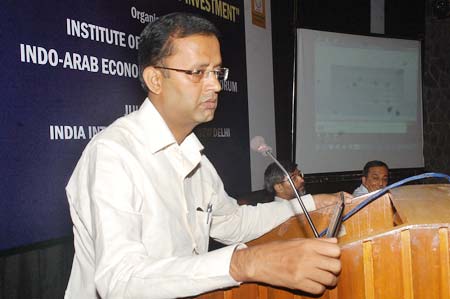
Speaker: Dr Mohammad Tariq, Associate Professor of Economics at AMU
Dr Mohammad Tariq, Associate Professor of Economics at AMU, said the Indo-ASEAN trade was well below its potential. “By 2050, India would be the third largest economy”, but the contribution to it from ASEAN would not be very impressive.
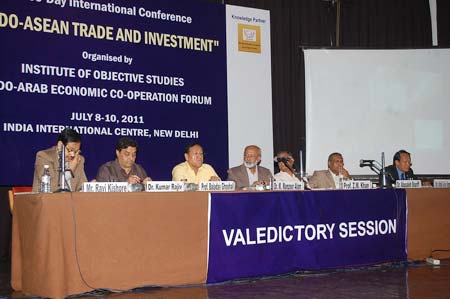
Valedictory Session
The Valedictory Session was chaired by Dr Mohammad Manzoor Alam.
Economist Abusaleh Sharif said the only way India could reap a good demographic devident would be to concentrate more on manufacturing, which had a greater potential for job creation.
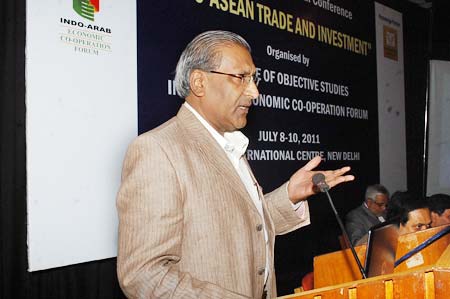
Speaker: Dr Abusaleh Sharif, Chief Economist, NCAER, New Delhi
He disagreed with the idea of a common currency for the ASEAN because it was too diverse and the economic growth level between the countries was too uneven and disparate. He said ASEAN was still not a great source of FDI for India, except Singapore.
He pointed out that ASEAN nations could now directly deal with Indian states and thus increase the ease of trade and investment in India.
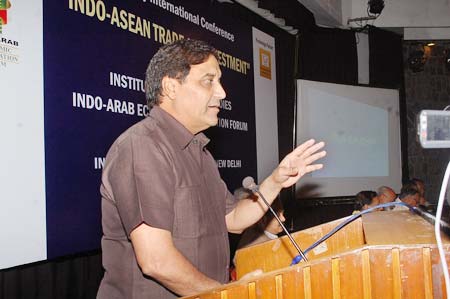
Speaker: Prof. Kumar Rajiv, Professor of Management at Jodhpur University
In his address Prof. Kumar Rajiv, Professor of Management at Jodhpur University, India should think seriously of moving trade and investment into Africa which had immense potential for decades to come.
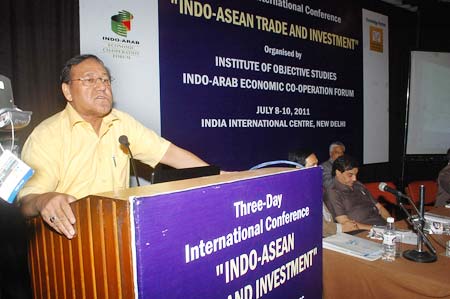
Speaker: Prof. Baladas Ghoshal, Distinguished Fellow, Peace and Conflict Studies, New Delhi
In his valedictory address, Prof. Baladas Ghoshal, Distinguished Fellow Peace and Conflict Studies, New Delhi, made a comparison between the achievements of China and India and found India trailing in many areas.
On most issues India had an “approach”, while China had a firm policy. China had a project, a game plan, but India did not. India was reactive while China was pro-active, Prof. Ghoshal observed. India tended to follow in ASEAN what China was doing there.
“We don’t have a roadmap, which China had.” China met deadlines in its projects, India did not. Bureaucracy saw to it in India that projects were delayed. In China, every project site had a bill board that clearly announced the start and finish date of the project. In India it was not there. These issues must be taken care of, he urged.
Elaborating on the Indo-China equation, he said China did not interfere in the internal affairs of ASEAN, ran a “cheque book diplomacy helping out the weaker countries, Laos, Cambodia, and Myanmar were bound to it thus”, and it conducted an “infrastructure diplomacy” by building crucial infrastructure in ASEAN. India had no such leverage there and must look for alternative ways of making its presence felt.
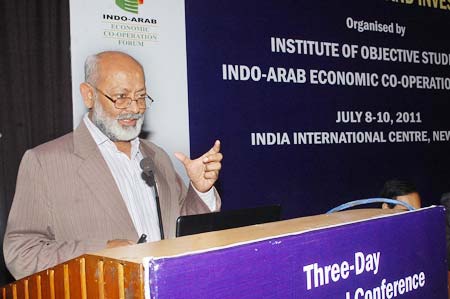
Speaker: Dr Mohammad Manzoor Alam, Chairman, IOS
In his presidential address, Dr Mohammad Manzoor Alam asked participants to look for five points each which should improve Indo-ASEAN ties. “Kindly mail it to me at my IOS e-mail”, he concluded.
A vote of thanks was proposed by Mr Ravi Kishore.
The conference passed the following “Delhi Declaration” at the end: In due recognition of the emerging geo-political realities of the world Institute of Objective Studies (IOS) in collaboration with Indo Arab Economic Co-operation Forum (FORUM) organized an International Conference on the theme of ‘Indo-ASEAN Trade and Investment’ from July 8-10,2011 at the India International Centre, New Delhi. Attended by several international delegates, members of the diplomatic corps of the concerned nations, leading persona of the business, financial and economic domain, academic and public opinion leaders the Conference deliberated on various aspects of the theme across seven sessions, besides the inaugural session. After due deliberation it concluded as under:
“Given the existing and future nature of the emerging world order, it is imperative that the nations of ASEAN and India, collaborate to face the challenges, amongst other things, of geography and economy. This would enable all the participating nations to meet the issues of natural disasters, maritime security, exploitation of oceanic wealth, more equitable distribution of resources of water and other natural resources. That the affected parties have much in common by way of legacy, culture, various religious beliefs and above all a wealth of energy resources, makes this process eminently feasible and actionable. Following the processes of longitudinal thinking a better future can be crafted for all participating communities.”
Towards that end it is hereby resolved:
-
To set up a standing consultative committee under the auspices of IOS to coordinate and take the mission of this collaborative effort forward. The Committee is further mandated to draw up a feasible and implementable programme to take the matter forward. A follow up meeting should be organized under auspices of this committee for creating a wider participatory base, as soon as the documented action plan is ready.
-
The IOS and the Forum envisages a comprehensive partnership between India and the ASEAN that extends beyond economic relations to facilitation of high growth and sustainable development in the region.
-
The IOS and Forum shall constitute high level committees comprising decision makers and thought leaders from India and ASEAN to steer the institutional mechanism that shall govern partnership in areas of trade, investments and technology sharing.
-
The IOS and Forum shall seek to open chapters in ASEAN to promote the spirit of partnership and development.
-
The IOS and FORUM shall hold conference on Indo-ASEAN partnership for development in the participating countries on a rotational basis.
-
This Conference will endeavour and impress upon the Government of India and the RBI to facilitate establishment of Participatory Banking and Financial Institutions by bringing forth necessary changes/amendments in institutional and regulatory framework.